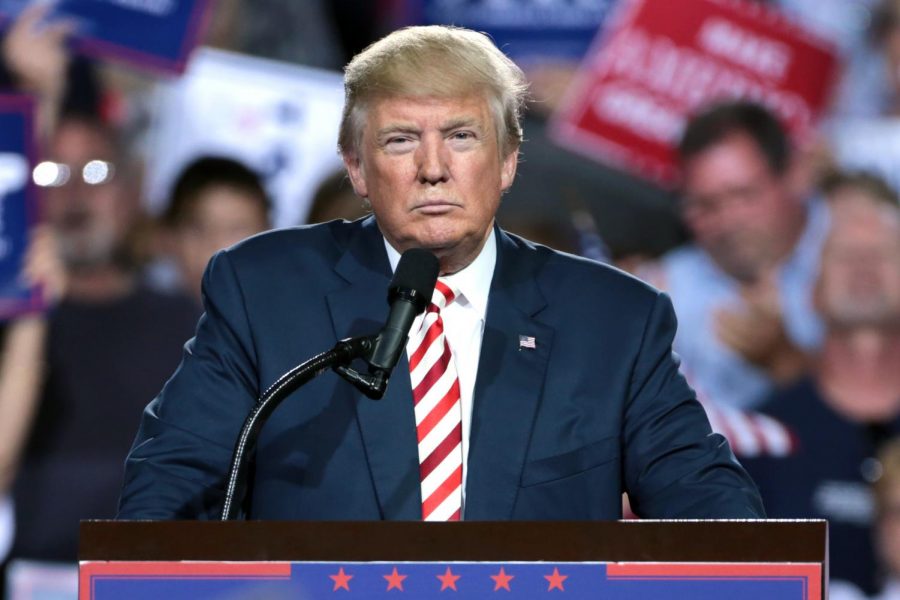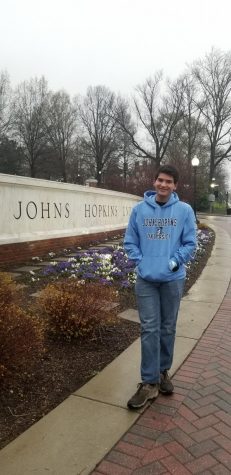Journalists must fight Trump’s silencing regime
Gage Skidmore from Peoria, AZ (Wikimedia Commons)
President Donald Trump at campaign rally in Arizona in 2016.
October 26, 2018
President Trump has never been supportive of media sources that oppose his administration, but his reaction to a recent tragedy, while hard to decipher, reveals his hostility in a new light.
On Oct. 2, 2018, Saudi journalist Jamal Khashoggi was detained and brutally executed in the Saudi Arabian consulate in Istanbul. Following this event, the international community condemned the Saudis with the French, British, Germans, Spanish and United Nations calling the event “deeply troubling” and worthy of a “full-scale investigation.”
However, let’s look over that list one more time, isn’t a major, democratic power missing?
Yes, the United States of America.
Despite a White House press release condemning the tragedy and demanding that the Saudis reveal whatever information they have, Trump very clearly had his own opinions on the matter, opinions that didn’t seem to deviate from those of our “Saudi allies,” who vehemently denied the accusation. Trump dismissed the possibility of such an attack as a “conspiracy theory” against our Arab allies.
Much like the Saudis, Trump has not been quiet in his hatred of left-leaning media, calling news sources like CNN, The New York Times and MSNBC “fake news,” “threats to democracy” and “responsible for the anger we see in our society.” He has even gone so far as to kick liberal reporters out of several of his press conferences and speeches. While he has never stooped so low as to suggest killing the opposition, his beliefs are quite clear.
Trump’s statements on the Khashoggi case are seemingly innocent, however, read them carefully. As more information related to the Saudis’ guilt was revealed, he said that the cover-up has been one of the “worst in history” and that “[a cover-up] is quite simple.” Why would he say that a cover-up is an easy thing to do? What reason does he have to side against our NATO allies in their treatment of the Saudis? Suppose that he agrees with the choices made by his Saudi counterparts and wishes for a silent opposition back home; doing so makes these comments more clear. His behavior makes it clear that he doesn’t value American journalists abroad and his lack of outrage gives foreign governments the impression that such behaviors won’t be punished by the United States if there are other issues (such as a billion dollar arms deal) at stake.
Looking a year or so back we see a similar, although less gruesome attack, on a journalist, this time in the US by a Republican representative. Montana Representative Greg Gianforte was hosting his final campaign event in the spring of 2017. When reporter Ben Jacobs asked him about federal health care, Gianforte responded by body slamming him to the ground. Although he later pleaded guilty to assaulting Jacobs, he received no punishment and won the election regardless.
At a recent rally in Missoula, Montana, the President spoke about Mr. Gianforte, saying that “Any guy that can do a body slam, he’s my kind of guy… [and] I [thought] it might help him [win the election].”
Trump is not only fine with attacking journalists who oppose him and his party, but also believes that such acts are appealing to voters. He believes that this violence is something deserving of praise and admiration. What prompted him to think this, I don’t know, but the results are clear: our President will allow these attacks to continue only defending journalists if it’s politically expedient. With a strong base supporting him and a bomb arriving at the CNN office, his ideas are spreading.
As citizens of this nation, it is our responsibility to seek the truth, act on that knowledge and in doing so, improve our society. Our President is threatening this cycle through the use of violence and mockery against those who oppose his narrative. By treating these journalists with contempt and hatred he is ensuring that others won’t step up to fill their roles, lest they face attack themselves. In this act, he may forever change the shape of our nation and skew the path of the “truth” for years to come.
It is through journalism that people are able to better understand the society in which they live and in knowing more are able to make educated decisions which will affect their world. We need this work done to be informed global citizens and must ensure that it is done.
Therefore, like Khashoggi, we must fight back against this regime that wishes to suppress free thought and expression for its own gains. We must fight for the right of all citizens to learn about our government, its leaders and its advisers and all who practice just and rightful authority. We must continue to spread the truth no matter what the risks of doing so. In taking these responsible, journalistic risks, we serve a higher purpose. One which puts the truth above the credibility of a party. One which aims to maintain our free democracy rather than watching it rot into ignorance and oppression. In carrying out this goal, we can defeat the suppression of and attacks on the media that our President wishes to maintain.










